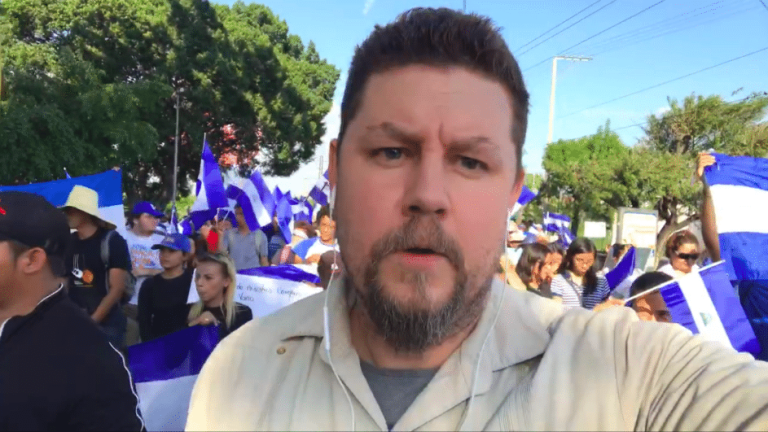2 de febrero 2022

Children of Exile: The Births “Sowing Hope” in the Camp of Nicaraguan Farmers

PUBLICIDAD 1M
PUBLICIDAD 4D
PUBLICIDAD 5D
After years of living and working in Nicaragua, US journalist Tim Rogers knows the country like a local. He shared a few of his favorite experiences

After years living and working in Nicaragua
Tim Rogers moved to Nicaragua in 2004, after quitting his job for The Tico Times Costa Rica. He had plans to attend Columbia Journalism School but, instead, he decided to build a life in the middle of Central America. During the years that Tim Rogers was able to freely immerse in Nicaraguan culture, he travelled the country reporting on stories from coast to coast, interviewed politicians, and even mastered the local slang.
After a while, he founded The Nicaragua Dispatch, an English-language online newspaper committed to expanding readers’ understanding of Nicaragua. The presence of the American journalist didn’t go unnoticed, and while people who only met him a few times still call him by affectionate nicknames, others did not take him and his work so kindly.
In April 2018, Tim became one of the first foreign journalists to cover the Nicaraguan civic uprising and, as a consequence, it has been unsafe for him to return to the country: Daniel Ortega’s government falsely accused him of being a CIA agent, and although it seemed like a joke at first, the accusations became so severe that he had no choice but to leave.
With more than 20 years of experience as a journalist in both Latin America and the U.S., Tim has strong, personal, and professional ties to Nicaragua. He knows the country like a local. In this interview, he shared a few of his Nica experiences.
Tim, what is your favorite fritanga spot?
La carne asada de la Emelina Ñata in El Barrio Loco, Masaya. Full order “hermoso” with extra de ensalada de repollo, queso frito, tajadas, y dos Toñas pero bien heladas. (Pro Tip: Go early for tajadas; they always run out by 6:15 pm). La Ñata is not only my favorite fritanga, it’s my favorite food in the world. I’m tearing up just thinking about it.
What are some nicknames that Nicaraguans have given you?
Chele; Tin; Comandante Beso de Mono; Kevin Youkilis (because I wear a Red Sox hat and Nicaraguans used to think I looked like the former Boston third baseman); agente de la CIA; golpista.
What is your favorite Nicaraguan city, and the best thing to do there?
My favorite city is Granada, mi Gran Sultana. I miss her dearly. I miss eating tostones con queso on the lakeshore with my wife. I love going to Catarina to buy plants. I miss butaqueando with my friends in the evening. I miss going to baseball games in the old Roberto Clemente Stadium (QEPD) on Masaya’s malecón (sigh).
What is one of your most embarrassing moments during an interview?
During my first trip to the Caribbean Coast I went to interview Brooklyn Rivera, who was meeting with local YATAMA leaders on a farm. Some guy from YATAMA went up to Rivera and informed him that this unknown chele standing under the mango tree wanted to ask him some questions. I only assumed that’s what they said —they were speaking in Miskito — but as Rivera twisted his face into a frown, I grew suspicious about whether my message was being translated accurately. Rivera eventually pointed towards me and said “silla”. I said, “No soy CIA, soy periodista.” Brooklyn smiled and pointed again at the plastic chair behind me, “No, hombre, toma silla.” In hindsight, I guess that mix-up might have been foreshadowing.
What was the most interesting story that you've covered in Nicaragua?
For me, the most exciting stories were always outside of the city — in the countryside, in the mountains, in the jungle, on the Caribbean coast. One of the most interesting reporting trips I ever made was to Bilwi, where — in the same three-day period — I reported on an outbreak of Grisi Siknis in Kamla, and an indigenous separitist movement that was trying to form the “Communitarian Nation of the Moskitia.” I ended up carrying a head of garlic and a lime in my pocket as a talisman against Grisi Siknis, and interviewing a separtist named Hitler Martinez all in the same weekend. Strange days indeed.
It’s no secret that the Nicaraguan government falsely accused you of being a CIA agent. You also shared your embarrassing mix-up with ‘silla’ and ‘CIA’ - and mentioned the CIA agent nickname. Is that nickname used in the context of the false accusations, or did people in Nicaragua already call you this jokingly beforehand?
It started before that, it must have been 2007, and it happened for the first time at a press conference with Omar Cabezas. He was the Human Rights Ombudsman for the Sandinistas, and I asked a question - he didn’t like my question, so he called me a CIA agent. So there were other journalists who would joke, and say “ah, there comes the CIA agent”.
And then it became a bit more serious in 2009, when I found out the sandinistas really did think I was a CIA agent. They were keeping tabs on me, I was being followed in the streets, I was warned that people were looking into me, my phones were tapped. Stuff like that. It went from sort of being what I thought was a joke to something that became a little bit more serious, until of course at the end, when I had to leave the country.
PUBLICIDAD 3M
Confidencial es un diario digital nicaragüense, de formato multimedia, fundado por Carlos F. Chamorro en junio de 1996. Inició como un semanario impreso y hoy es un medio de referencia regional con información, análisis, entrevistas, perfiles, reportajes e investigaciones sobre Nicaragua, informando desde el exilio por la persecución política de la dictadura de Daniel Ortega y Rosario Murillo.
PUBLICIDAD 3D